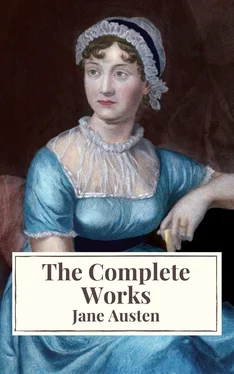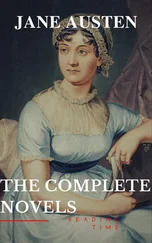Mrs. Dashwood, whose terror as they drew near the house had produced almost the conviction of Marianne's being no more, had no voice to inquire after her, no voice even for Elinor; but SHE, waiting neither for salutation nor inquiry, instantly gave the joyful relief;— and her mother, catching it with all her usual warmth, was in a moment as much overcome by her happiness, as she had been before by her fears. She was supported into the drawing-room between her daughter and her friend;— and there, shedding tears of joy, though still unable to speak, embraced Elinor again and again, turning from her at intervals to press Colonel Brandon's hand, with a look which spoke at once her gratitude, and her conviction of his sharing with herself in the bliss of the moment. He shared it, however, in a silence even greater than her own.
As soon as Mrs. Dashwood had recovered herself, to see Marianne was her first desire; and in two minutes she was with her beloved child, rendered dearer to her than ever by absence, unhappiness, and danger. Elinor's delight, as she saw what each felt in the meeting, was only checked by an apprehension of its robbing Marianne of farther sleep;— but Mrs. Dashwood could be calm, could be even prudent, when the life of a child was at stake, and Marianne, satisfied in knowing her mother was near her, and conscious of being too weak for conversation, submitted readily to the silence and quiet prescribed by every nurse around her. Mrs. Dashwood WOULD sit up with her all night; and Elinor, in compliance with her mother's entreaty, went to bed. But the rest, which one night entirely sleepless, and many hours of the most wearing anxiety seemed to make requisite, was kept off by irritation of spirits. Willoughby, "poor Willoughby," as she now allowed herself to call him, was constantly in her thoughts; she would not but have heard his vindication for the world, and now blamed, now acquitted herself for having judged him so harshly before. But her promise of relating it to her sister was invariably painful. She dreaded the performance of it, dreaded what its effect on Marianne might be; doubted whether after such an explanation she could ever be happy with another; and for a moment wished Willoughby a widower. Then, remembering Colonel Brandon, reproved herself, felt that to HIS sufferings and his constancy far more than to his rival's, the reward of her sister was due, and wished any thing rather than Mrs. Willoughby's death.
The shock of Colonel Brandon's errand at Barton had been much softened to Mrs. Dashwood by her own previous alarm; for so great was her uneasiness about Marianne, that she had already determined to set out for Cleveland on that very day, without waiting for any further intelligence, and had so far settled her journey before his arrival, that the Careys were then expected every moment to fetch Margaret away, as her mother was unwilling to take her where there might be infection.
Marianne continued to mend every day, and the brilliant cheerfulness of Mrs. Dashwood's looks and spirits proved her to be, as she repeatedly declared herself, one of the happiest women in the world. Elinor could not hear the declaration, nor witness its proofs without sometimes wondering whether her mother ever recollected Edward. But Mrs. Dashwood, trusting to the temperate account of her own disappointment which Elinor had sent her, was led away by the exuberance of her joy to think only of what would increase it. Marianne was restored to her from a danger in which, as she now began to feel, her own mistaken judgment in encouraging the unfortunate attachment to Willoughby, had contributed to place her;— and in her recovery she had yet another source of joy unthought of by Elinor. It was thus imparted to her, as soon as any opportunity of private conference between them occurred.
"At last we are alone. My Elinor, you do not yet know all my happiness. Colonel Brandon loves Marianne. He has told me so himself."
Her daughter, feeling by turns both pleased and pained, surprised and not surprised, was all silent attention.
"You are never like me, dear Elinor, or I should wonder at your composure now. Had I sat down to wish for any possible good to my family, I should have fixed on Colonel Brandon's marrying one of you as the object most desirable. And I believe Marianne will be the most happy with him of the two."
Elinor was half inclined to ask her reason for thinking so, because satisfied that none founded on an impartial consideration of their age, characters, or feelings, could be given;—but her mother must always be carried away by her imagination on any interesting subject, and therefore instead of an inquiry, she passed it off with a smile.
"He opened his whole heart to me yesterday as we travelled. It came out quite unawares, quite undesignedly. I, you may well believe, could talk of nothing but my child;—he could not conceal his distress; I saw that it equalled my own, and he perhaps, thinking that mere friendship, as the world now goes, would not justify so warm a sympathy—or rather, not thinking at all, I suppose—giving way to irresistible feelings, made me acquainted with his earnest, tender, constant, affection for Marianne. He has loved her, my Elinor, ever since the first moment of seeing her."
Here, however, Elinor perceived,—not the language, not the professions of Colonel Brandon, but the natural embellishments of her mother's active fancy, which fashioned every thing delightful to her as it chose.
"His regard for her, infinitely surpassing anything that Willoughby ever felt or feigned, as much more warm, as more sincere or constant—which ever we are to call it— has subsisted through all the knowledge of dear Marianne's unhappy prepossession for that worthless young man!—and without selfishness—without encouraging a hope!—could he have seen her happy with another—Such a noble mind!— such openness, such sincerity!—no one can be deceived in HIM."
"Colonel Brandon's character," said Elinor, "as an excellent man, is well established."
"I know it is"—replied her mother seriously, "or after such a warning, I should be the last to encourage such affection, or even to be pleased by it. But his coming for me as he did, with such active, such ready friendship, is enough to prove him one of the worthiest of men."
"His character, however," answered Elinor, "does not rest on ONE act of kindness, to which his affection for Marianne, were humanity out of the case, would have prompted him. To Mrs. Jennings, to the Middletons, he has been long and intimately known; they equally love and respect him; and even my own knowledge of him, though lately acquired, is very considerable; and so highly do I value and esteem him, that if Marianne can be happy with him, I shall be as ready as yourself to think our connection the greatest blessing to us in the world. What answer did you give him?—Did you allow him to hope?"
"Oh! my love, I could not then talk of hope to him or to myself. Marianne might at that moment be dying. But he did not ask for hope or encouragement. His was an involuntary confidence, an irrepressible effusion to a soothing friend—not an application to a parent. Yet after a time I DID say, for at first I was quite overcome—that if she lived, as I trusted she might, my greatest happiness would lie in promoting their marriage; and since our arrival, since our delightful security, I have repeated it to him more fully, have given him every encouragement in my power. Time, a very little time, I tell him, will do everything;—Marianne's heart is not to be wasted for ever on such a man as Willoughby.— His own merits must soon secure it."
"To judge from the Colonel's spirits, however, you have not yet made him equally sanguine."
"No.—He thinks Marianne's affection too deeply rooted for any change in it under a great length of time, and even supposing her heart again free, is too diffident of himself to believe, that with such a difference of age and disposition he could ever attach her. There, however, he is quite mistaken. His age is only so much beyond hers as to be an advantage, as to make his character and principles fixed;—and his disposition, I am well convinced, is exactly the very one to make your sister happy. And his person, his manners too, are all in his favour. My partiality does not blind me; he certainly is not so handsome as Willoughby—but at the same time, there is something much more pleasing in his countenance.— There was always a something,—if you remember,—in Willoughby's eyes at times, which I did not like."
Читать дальше












